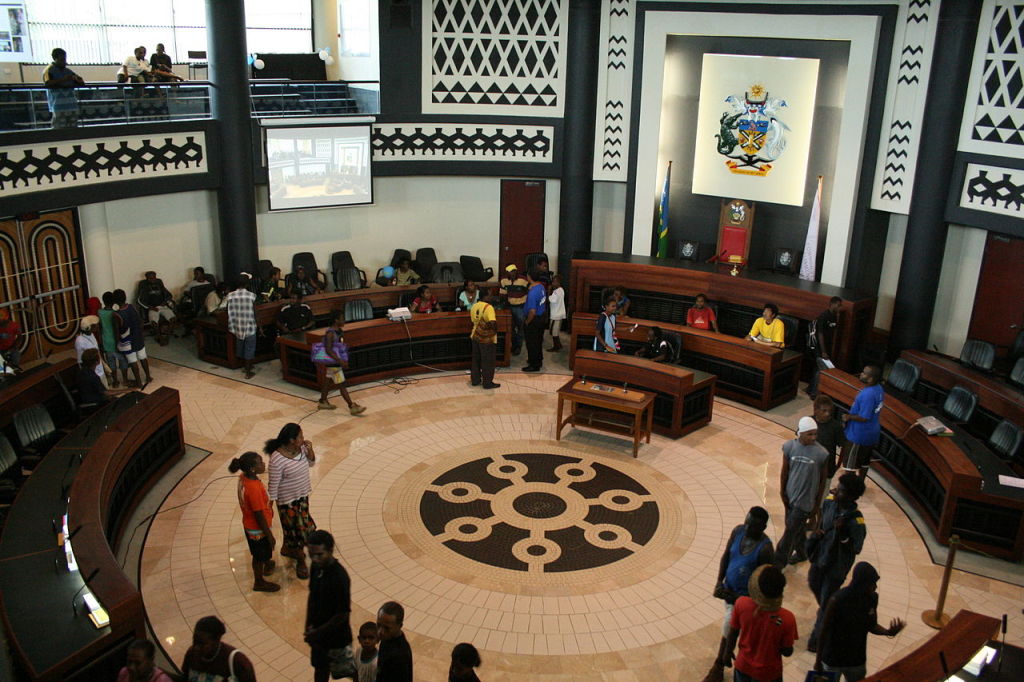Democracy can and does take root in poor countries, but only if we look at small states
Does democracy fail in poor states, with weak economies and a lack of basic education? According to Jack Corbett and Wouter Veenendaal, this isn’t the case (though it is often thought to be). Sharing the findings of new research, they argue that smaller states particularly can create healthy and sustainable democracies, with more than half of low-income democracies coming under the definition of small states.
The Parliament of the Solomon Islands (Credit: Dan Hetherington, CC BY SA 3.0)
For decades political scientists have been trying to identify the key cause of democratic transition and consolidation. At the heart of this discussion is an attempt to pin down the essence of what democratic government is all about; to discover what makes it work and why. For those of us who believe in the normative potential of this regime type it is one of the most important questions we could ask and as such the answers are not just important for countries seeking to establish or consolidate democracy but also for established polities, like the UK.
By and large, however, this discussion has tended to exclude the world’s smallest states. As we outline in more depth here, there are a number of reasons for this oversight but the ramifications are significant because small states (especially those 40 states with populations of less than 1 million people) also tend to be disproportionately and stubbornly democratic. So, the question is why?
There are a number of age-old answers, including the view advanced by Montesquieu and Rousseau that when it comes to democracy ‘small is beautiful’. We cannot do justice to these arguments here. Instead, we test the most commonly cited democracy-stimulating factor – economic growth or modernization theory – against the experience of small states. Contra received wisdom, we find that democracy is clearly possible in poor countries but we only find this out if we bring small states back into our analysis.
The main argument of modernization theory, as first formulated by Seymour Martin Lipset and later adopted by many scholars, is that the improvement of the material and social conditions of the lower classes generates a more favourable attitude towards democracy. According to the modernization school, the combination of economic development, industrialization, and education creates a society whose citizens are overall more assertive and politically aware. Consequently, incentives to participate in formal politics grow, and because of increased education and knowledge, citizens are less susceptible to the rhetoric of demagogues and populist or authoritarian leaders.
For a long time, democratic but extremely poor India was seen as the major deviant case of modernization theory, and later the African democratizing states of Botswana, Ghana, Namibia, and South Africa have been added to this list. On the other side of the spectrum, counterevidence for the theory has been found in the examples of the wealthy yet undemocratic Persian Gulf-states, and the Southeast Asian countries of Singapore and Brunei. Only rarely has attention been paid to the largest group of poor, yet almost without exceptions democratic states in the Pacific Islands.
Out of the eleven small island states in the region covered by Freedom House, nine are classified as democracies as of 2014. The two exceptions are Fiji and the Solomon Islands but these classifications are questionable with the former having just recently held democratic elections for the first time in 8 years while Solomon Islands held free and fair elections in 2006 and 2010. With the exception of Palau, all Pacific island states have gross national income per capita levels of below US$ 10.000, and therefore rank similar to the bulk of African and Asian states.
Whereas industrialization and education are seen as core elements in the hypothesized causal connection between economic development and democratization, the Pacific small island states (but also small states in other world regions) because of their scale are disadvantaged on both counts. Economic development via industrialization has proved virtually impossible in the Pacific for a combination of well-known factors (reviewed in more depth here), including small populations, limited natural resources, remoteness, geographic and cultural fragmentation, vulnerability to external economic shocks, susceptibility to extreme events like cyclones and earthquakes, dependence on imports, and fragile environments.
Putting industrialization aside, economic growth and development remain constrained by disadvantages associated with economies of scale, which include high communication and energy costs, irregular transport routes, the disproportionate cost of public administration and infrastructure, skills shortages, and the absence of domestic capital. So, small states have unique development challenges that are in many ways more acute than in other regions, like Africa, where the inverse ‘resource curse’ arguments are more common.
The significance of education, a product of economic growth, is also central to the modernist argument. Historically, most Pacific Island countries have not had national universities, which means that islanders have to go abroad to acquire their diplomas, and often do not return afterwards, resulting in a migratory brain drain that undermines economic capacity. This problem is particularly acute for governments who often find it difficult to fill key administrative posts.
Capacity issues also loom large in aid donor accounts of governance problems in the Pacific. Indeed, echoing the basic assumptions of the modernization thesis, prior to elections significant donor effort goes into educating voters in the Pacific about the democratic process. More generally, the challenge of achieving economic modernization has contributed to renewed attention about the vulnerabilities of small states among international organizations, with the United Nations having set up the Small Island Developing States Network, for instance.
Combined, all of these factors are said to stifle economic growth prospects and stunt the associated democratic dividend that large-scale modernization ought to provide, and yet, across the region, elections are held (around 200 in the 13 independent or self-governing Pacific Island countries since the 1960s) and the process of compromise and conciliation typical of this type of government is largely maintained. Even in a country like Nauru, where momentous economic crisis during the late 1990s and early 2000s should, in theory, have caused the breakdown of democratic rule, democracy has survived despite on-going political volatility. Perversely, the two countries in the Pacific with the strongest growth prospects due to their relatively larger size and natural resource endowments – Fiji and Solomon Islands – have had the most trouble sustaining democratic government. So, rather than aiding democracy, in the Pacific modernist development appears to undermine it.
In total, the number of democracies across the world with GDP per capita levels under US$ 10.000 is 11 if a population threshold of 1 million citizens is applied. If the threshold is removed, however, the Freedom House figure rises to 23, with the Caribbean states of Belize and Guyana, and the African states of Cape Verde and São Tomé and Príncipe added to Pacific examples, meaning that more than half of low-income democracies are small states. As such, the experience of these small states forms a challenge to the core assumptions of modernization theory, and significantly weakens its claim to being a necessary precondition for democratization.
Democratic development in poor societies is clearly possible, but the extent to which this is the case can only be observed if small states are included in our analysis. Consequently, while our discussion is not exhaustive – we have much more to say about democratisation based on the experience of small states here – it is illustrative of the importance of these states when considering answers to questions of this nature.
—
Note: this post represents the views of the author and not those of Democratic Audit or the LSE. Please read our comments policy before posting.
 Jack Corbett is a Research Fellow at the Griffith Business School, Australia.
Jack Corbett is a Research Fellow at the Griffith Business School, Australia.
 Wouter Veenendaal is a Post Doctoral researcher at the KITLV/Royal Institute of Southeast Asian and Caribbean Studies.
Wouter Veenendaal is a Post Doctoral researcher at the KITLV/Royal Institute of Southeast Asian and Caribbean Studies.






 Democratic Audit's core funding is provided by the Joseph Rowntree Charitable Trust. Additional funding is provided by the London School of Economics.
Democratic Audit's core funding is provided by the Joseph Rowntree Charitable Trust. Additional funding is provided by the London School of Economics.
… [Trackback]
[…] There you will find 2532 more Infos: democraticaudit.com/?p=9480 […]
Democracy can and does take root in poor countries, but only if we look at small states https://t.co/toN1GWX9CO via @Inoreader
Democracy in small states. https://t.co/y0ZjP9HYvC
“Democracy can succeed in poor small states”. Nice piece by my very smart @Griffith_Uni colleague Jack Corbett: https://t.co/xKHl5WkMiu
Democracy can and does take root in poor countries, but only if we look at small states https://t.co/tWuhSap3jy nice one @jack_corbett456
Democracy can and does take root in poor countries, but only if we look at small states https://t.co/JTuefHGZKB
Democracy can and does take root in poor countries, but only if we look at small states https://t.co/Rio9mMahYT